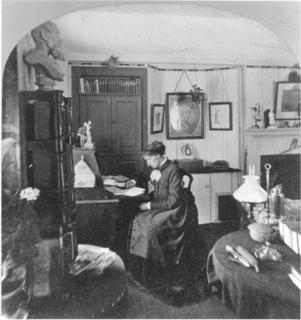 .....Louisa May Alcott in her writing room at Orchard House
.....Louisa May Alcott in her writing room at Orchard HouseCube: Good question. I would doubt it. Odd. I inherited all of these old children's books. I read Nancy Drew, Hardy Boys and Tom Swift as a child. The Nancy Drew's were all written in the 1930's and Nancy was always in a roadster with a rumble seat going to roadhouses and tea rooms. It all seemed so odd to me. Why do you think little girls read Little Women?
Kathy: Do they still read it? I don't know. I suppose it could be the maturation process. Each girl embodied some personality trait. For stronger female role models, there are better contemporary books. I always go to the American Association of Libraries web site to see what the award winning kid books are...just to see what's out there. If you look at that site, you'll know how old you are by seeing what the last book you read as a child by when it was published.
Cube: Little Women was published in 1869, just after the Civil War. I wonder what appeals to children about the book? Sisterly love? Family?
Kathy: I think it was family for me. Safety and security were important. I loved the period details.
Cube: It certainly seemed to be about Jo, Jo, Jo. She was Little Women's Marcia in the Brady Bunch. I looked at it's family aspect and interactions as well, andI didn't have sisters, so I suppose there was that fascination. Did you envy Jo her garrett? (the attic Jo went to escape and do her writing).
Kathy: Well, it was certainly romantic, but in reality gloomy and probably cold.
Cube: The whole "noble poverty" thing grated on me. When she asked her already sacrificing children to give up their miserly little Christmas breakfast to the German family, it seemed a bit much, even for Christian charity.
Kathy: How poor could they have really been? No new gloves and only one servant? Gee. Ain't it tough being the middle class. A lovely noblisse oblige gesture that didn't do much for the poor Germans, and what was Alcott's message there? Anti-immigrant? Useful plot point?
Cube: Well, that engagement of charity with the Germans ultimately killed her daughter. I do have favorite scenes that I love. Amy writing her will, when Beth is ill, making sacrifices of the mateial things that she loves. Jo running into Laurie in the street. He thinks she has a toothache, but she's really just submitted her stories. And I still love that scene of Amy in Europe, missing her family, knowing her sister is dying, alone and feeling her emotions as a full-formed adult, now, not the selfish girl. Also, Jo who stand so close to the fire she scores her dresses.

No comments:
Post a Comment